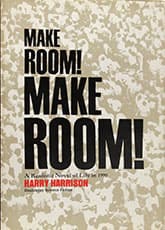Make Room! Make Room!
Critique • Quotes
 First edition
First editionFirst published
1966
Literary form
Novel
Genres
Science fiction, dystopia
Writing language
English
Author's country
United States
Length
Approx. 88,000 words
Too many stupid people
The novel Make Room! Make Room! was published right in the middle of the boom in warnings about overpopulation and depletion of resources in the 1960s and early 1970s. It actually preceded a number of more famous nonfictional works, like The Population Bomb (1968) and The Limits to Growth (1972), that raised the alarm. Science fiction author Harry Harrison says he actually got the idea in 1946.
But before we get too idolatrous about Harrison's prescience, note those other works have, in the years since, been criticized for having gotten it wrong—for having predicted famines, overcrowdedness and economic ruin that haven't occurred, at least not on the timetables they seemingly presented.
Note, I'm using careful language because arguments have also been made that at least some of those predictions have been misinterpreted. And some, if not all, the dire consequences may still be in play.
Still, reading Make Room! Make Room! in the twenty-first century, it's hard to avoid the realization Harrison's future world has not come about. New York by 1999 had nowhere near thirty-five million inhabitants, scrambling over each other to find a place to sleep, fighting over fetid water, swelling their bellies with foul-tasting soy and lentil paste, and keeping the police busy with constant crime and rioting.
Nor was he just off by a few years, as even twenty years after his future date we don't seem close to experiencing this particular apocalypse. Climate change is taking place, but that's not what Harrison foresaw in Make Room! Make Room!
Possible futures
Is it fair to criticize science fiction or other writers for predictions that don't come true? Is Nineteen Eighty-Four a bad book because George Orwell's vision of Big Brother didn't become full reality by that date? How about all those early speculative writers like Jules Verne and H.G. Wells whose future inventions and discoveries have never happened? (Though some have.) Not to mention the Golden Age greats like Isaac Asimov and Arthur C. Clarke who would have us zipping around the planets in spacecraft by this time—and who generally missed the digital revolution altogether.
One defence is that these fictional writers are not making predictions so much as they are discussing possible futures, and their work has actually helped deter from arriving. Harrison in Make Room!—I'm getting tired of the title's repetition—also argues for birth control as part of a solution, and population growth has indeed slowed in many countries due to the prevalence of contraceptives. Remember, the "Pill" was a controversial issue in the sixties.
A more interesting line of argument though is that the books are not really about factual predictions. They're about human beings and how they behave in crises. Orwell is showing how the powerful can manipulate people with language and he uses the extreme example of totalitarian regimes running the world to illustrate this. Harrison is showing how social structures can collapse and people revert to dog-eat-dog morality in the face of scarcity.
Harrison does write engagingly to draw his dismal picture of urban life under the pressure of numbers. Unlike the movie, Soylent Green, adapted from it, Make Room! sticks to the sordid ground-level interactions of the characters. A bit melodramatic and—I'll say it—predictable in parts. Even in my second reading, when I knew what was going to happen or not happen, I kept hoping for a surprise.
However, the author undercuts this it's-the-people-not-the-predictions defence by having one character, the aging Sol, repeatedly delivering lectures on how the world got to this overpopulated state and how we need to reduce the birth rate. As roommate for the protagonist, police officer Andy Rusch, he's actually an otherwise endearing character—if only he would shut up with the messages from the author.
Root problems
I also have issues with the analysis given in Make Room! that the underlying cause of the dire state of things is that people are stupid. In this book there's no understanding of power structures and economic relations in the world that perpetuate such misery for the masses. No acknowledgment that the root problems are not scarcity or overcrowding, but poor distribution of wealth and resources. Nope, people are just too greedy, self-centred and stupid to do the right thing.
And the character of Shirl, Andy's beautiful girlfriend who sleeps with men for food and shelter, is problematic today, though she also has some of the best scenes in the novel.
The novel wanders a bit as we follow Billy Chung, a young Asian whom Andy is tracking for having killed a man in a botched robbery. There's little suspense as we already know who committed the crime and we suspect how he's going to end up. We trail Billy in his desperate attempts to avoid capture mainly to give the author a chance to lead us through all the crumbling strata of the doomed city.
Still, it's a decent, provocative read. And if we are suddenly faced with a disastrous population explosion after all, I'll be eating my words—and reading Make Room! Make Room! again.
— Eric
Critique • Quotes

